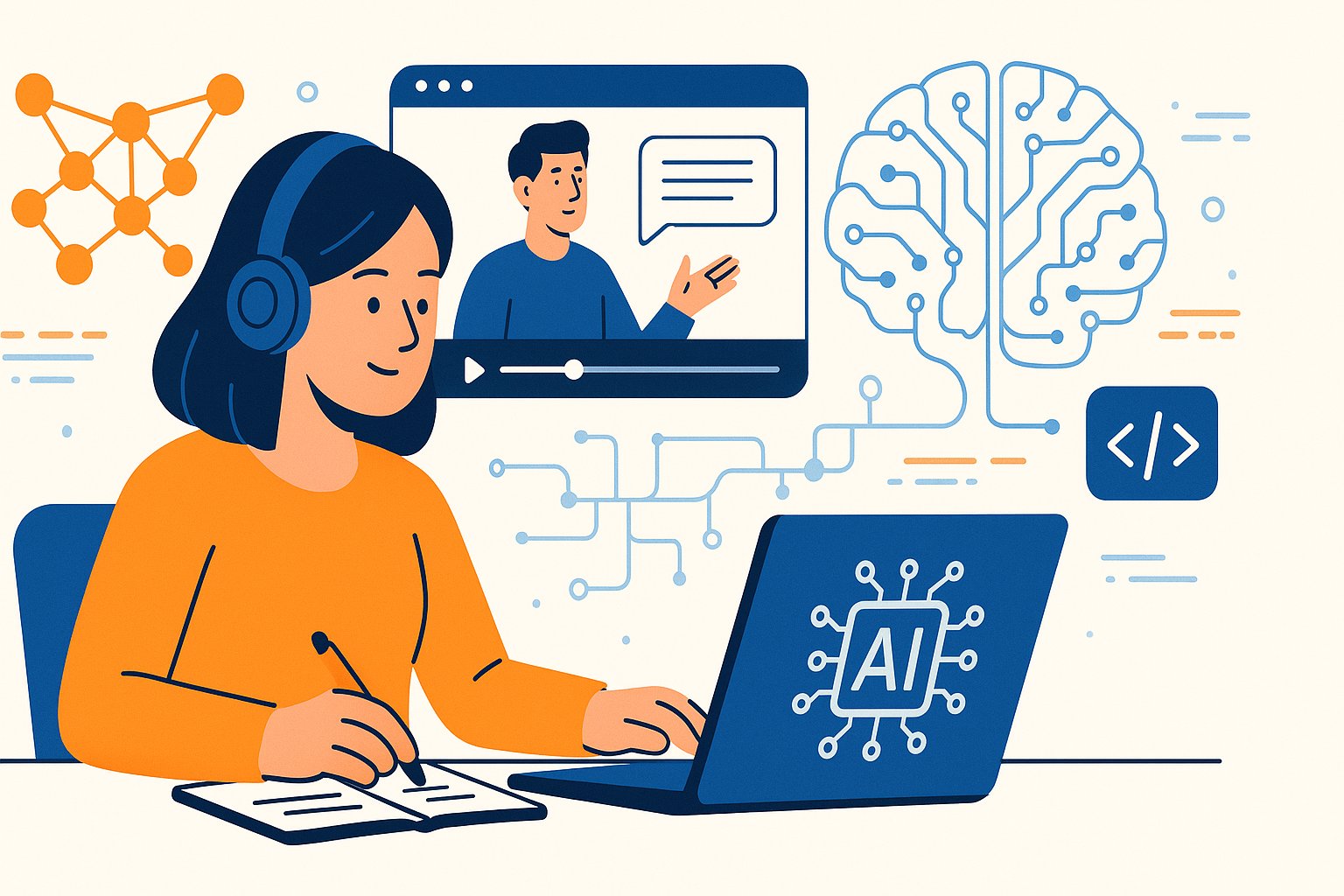15 AI Courses for Process Engineers that You Should Know About in 2025
Discover 15 essential AI courses tailored for process engineers in 2025, enhancing skills in automation, data analysis, and optimization. Elevate your career by mastering cutting-edge technologies and stay ahead in the evolving engineering landscape.
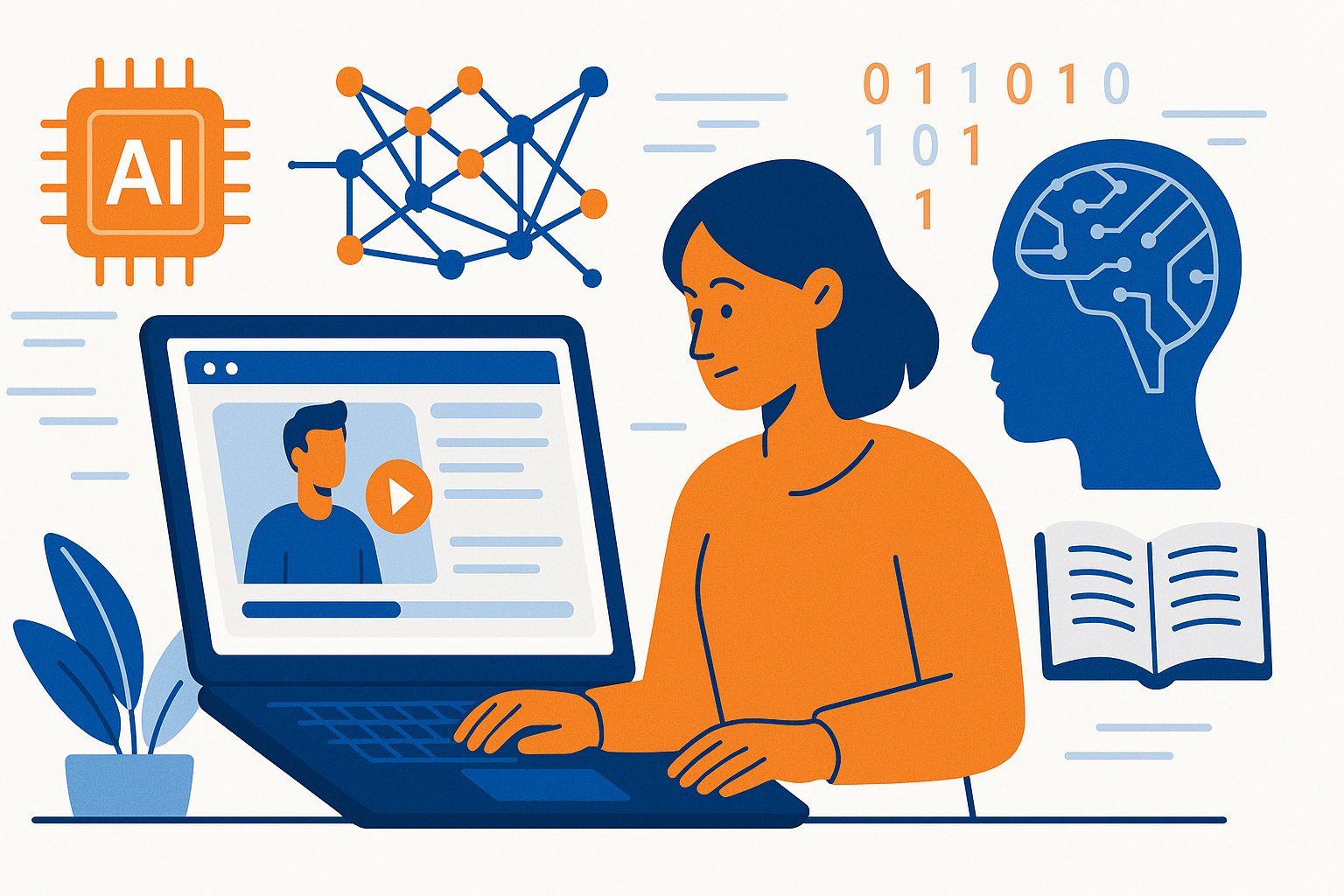
As artificial intelligence (AI) continues to permeate various industries, its impact on the workforce is becoming increasingly significant. For professionals in the field of process engineering, the integration of AI technologies has become a pressing priority. The need to upskill in AI is not just a competitive advantage but a necessity, as these technologies are poised to transform job roles and industry standards profoundly. By mastering AI, process engineers can ensure they remain indispensable in their roles and contribute to innovation and efficiency within their organizations.
Why AI matters for Process Engineers today
The urgency for process engineers to adopt AI skills is underscored by the rapid adoption of these technologies across sectors. Recent statistics indicate that 69% of businesses now utilize AI in some form, highlighting its growing prevalence. As AI technologies evolve, they offer process engineers new tools to enhance their capabilities and improve operational efficiencies. This article aims to guide process engineers in identifying the most suitable AI courses that can equip them with the necessary skills to thrive in this technologically advanced landscape.
The Growing Role of AI in Process Engineers
AI applications are increasingly being integrated into the field of process engineering. Automation of routine tasks, enhanced decision-making capabilities, and personalized process optimization are just a few examples of how AI is being utilized. These applications not only streamline workflows but also lead to significant innovations in how process engineers approach problem-solving and project management. The growing role of AI in this sector is reshaping traditional tasks and enabling professionals to focus on more strategic initiatives.
Benefits of becoming an AI expert in Process Engineers
For process engineers, achieving expertise in AI offers numerous benefits. It enhances their ability to analyze and interpret complex data sets, leading to more informed decision-making processes. Furthermore, AI expertise can increase job satisfaction by allowing professionals to engage in more creative and fulfilling work. By staying ahead of technological advancements, process engineers can secure their career prospects and drive meaningful change within their organizations.
This article will compare 15 AI courses tailored for process engineers, including the highly regarded CompleteAI Training program. These courses range from foundational programs to more advanced offerings, designed to cater to various learning needs and professional goals. Through this comprehensive guide, process engineers can make informed decisions about which AI courses will best support their career development and help them stay competitive in an AI-driven world.

Comparison: All AI Courses for Process Engineers (Updated Q2' 2025)
| Course Name | Provider | Price | Key Topics | Pros | Cons | Best For |
|---|---|---|---|---|---|---|
| AI for Process Engineers | Complete AI Training | $29/month (monthly), $8.25/month (billed annually) | Over 100 specialized video courses, certifications, AI tools, industry news | Highest rating, extensive range, daily updates, affordable pricing | Subscription based | Process Engineers professionals |
| Artificial Intelligence Nanodegree Program | Udacity | $148.50/month or $127/month with 4-month bundle | Optimization algorithms, Bayesian networks, minimax search, automated planning | Taught by industry pioneers, hands-on projects, strong foundational knowledge | Requires prior Python programming experience | General learners |
| AI, Deep Learning and MLOps Courses | DeepLearning.AI | Free or $39-$99/month on Coursera; $59/month full access | AI fundamentals, machine learning, MLOps, generative AI | Taught by Andrew Ng, wide range, flexible pricing | Some courses require prior knowledge | General learners |
| Certificate in Artificial Intelligence and Machine Learning | California Institute of Applied Technology | Varies; financial aid available | Practical AI labs, industry frameworks, AI career preparation | Live training, focus on practical applications | Requires significant prior IT experience | General learners |
| Big Data, Artificial Intelligence and Ethics | University of California, Davis | Free to audit; paid verified certificate | Big data opportunities, AI fundamentals, ethics | Beginner-friendly, focus on ethics, self-paced | Limited depth for advanced engineering | General learners |
| AI for Business Specialization | University of Pennsylvania (Wharton) | $79 total for 4 months | AI in business, ethical AI, TensorFlow, AutoML | Business-focused, hands-on projects, affordable | Less technical depth | General learners |
| CS50’s Introduction to Artificial Intelligence with Python | Harvard University | Free to audit; $299 for verified certificate | AI fundamentals, machine learning, Python projects | Strong coding focus, taught by Harvard professors | Requires 10-30 hours/week commitment | General learners |
| Certificate Program in AI Business Strategy | Johns Hopkins University | $2,600 | AI business strategy, ethical AI, risk management | Focus on strategy, industry mentors, hands-on projects | Higher cost | General learners |
| Develop LLM Powered Applications with LangChain | Udemy | $12.99 | LLM applications, prompt engineering, ReAct agents | Affordable, practical, updated content | Requires Python programming skills | General learners |
| Introduction to Artificial Intelligence (AI) | IBM via Coursera | Free to start; paid certification available | Core AI concepts, generative AI, market opportunities | High rating, beginner-friendly, short duration | May require further specialization | General learners |
| IBM AI Developer Professional Certificate | IBM via Coursera | $39-$79/month (3-6 months) | Prompt engineering, software development, AI model deployment | Comprehensive curriculum, practical skills | Intermediate difficulty | General learners |
Understanding AI Training for Process Engineers Professionals
As artificial intelligence (AI) continues to transform various industries, process engineers are finding new opportunities to integrate AI technologies into their workflows. With numerous courses available, selecting the right training can be challenging. This article compares several AI courses tailored for process engineers, highlighting their features, benefits, and target audiences.
Course 1: CompleteAI Training
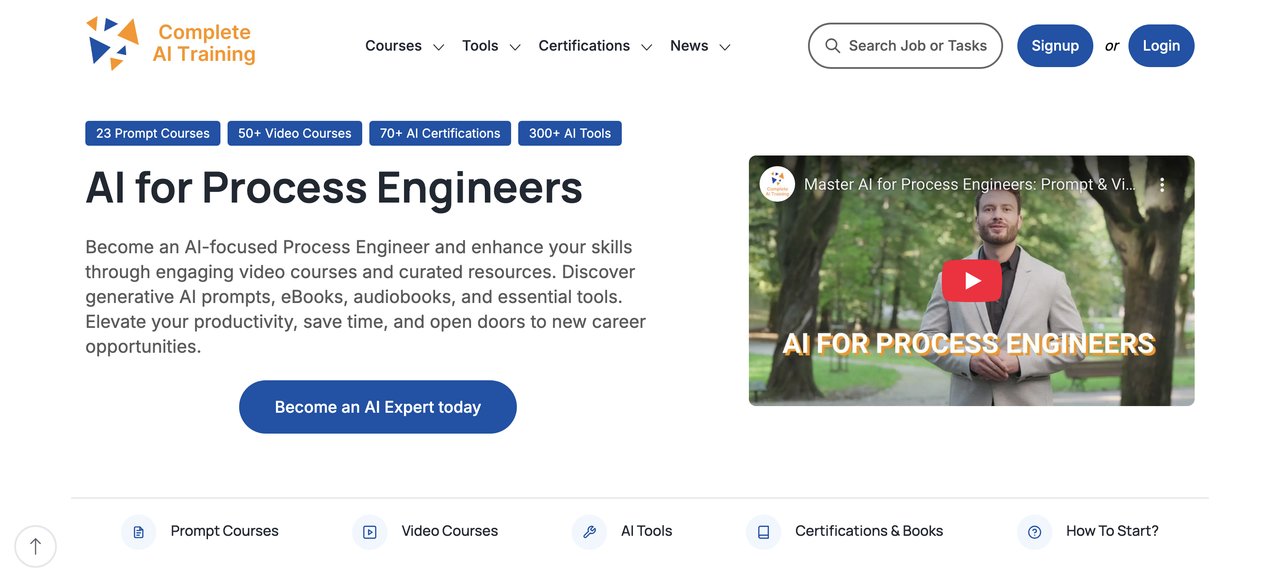
CompleteAI Training offers a comprehensive library of over 100 video courses and certifications specifically designed for process engineers. Subscribers gain access to up-to-date AI education, daily insights on new AI tools, and news relevant to their field.
Key Topics Covered: Extensive AI courses, latest AI tools, industry news
Target Audience and Skill Level: Process engineers at all levels seeking specialized AI knowledge
- Pros:
- Highly rated with the most complete offerings
- Daily updates on relevant AI tools and news
- Affordable pricing, especially with annual billing
- Cons:
- Subscription-based for continuous learning
Who Would Benefit: Process engineers looking for a broad and continuously updated AI curriculum will find this course particularly beneficial.
Course 2: Artificial Intelligence Nanodegree Program by Udacity
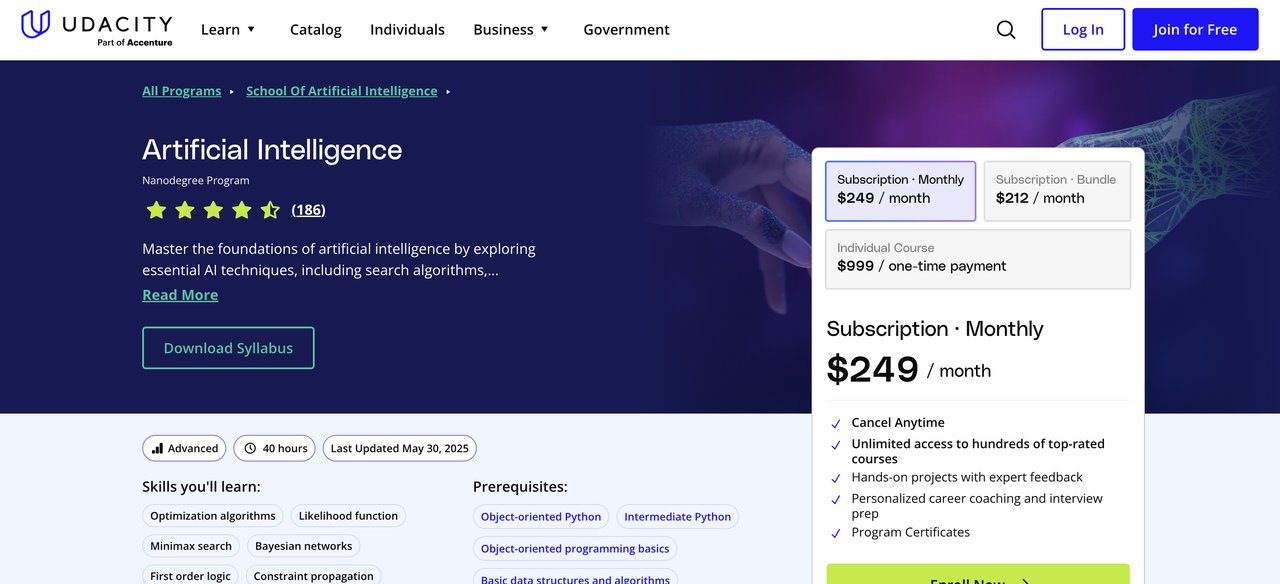
The Artificial Intelligence Nanodegree Program by Udacity covers essential AI concepts such as optimization algorithms and Bayesian networks. The course requires knowledge of object-oriented Python programming.
Key Topics Covered: Optimization algorithms, intelligent agents, strategic decision-making
Target Audience and Skill Level: Intermediate learners with Python programming experience
- Pros:
- Taught by industry pioneers
- Hands-on projects with real-world applications
- Strong foundational AI knowledge
- Cons:
- Requires prior Python programming experience
Who Would Benefit: Engineers with a coding background looking to deepen their understanding of AI strategies and applications.
Course 3: AI, Deep Learning and MLOps Courses by DeepLearning.AI
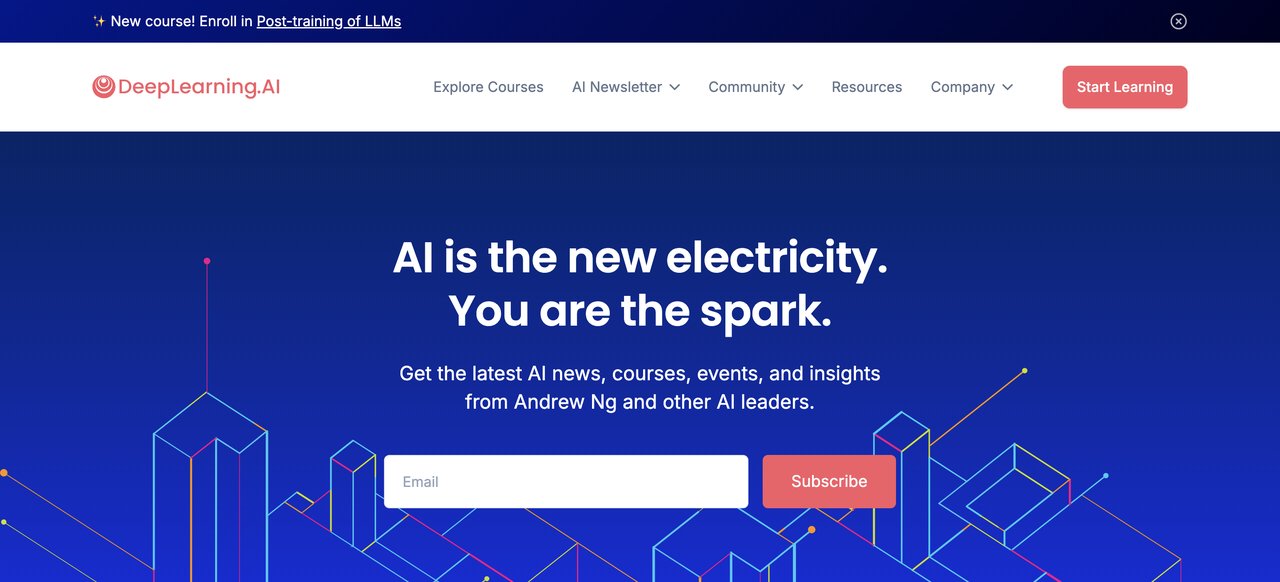
DeepLearning.AI offers a range of courses from introductory AI concepts to advanced machine learning and MLOps. Led by renowned AI expert Andrew Ng, these courses cater to both beginners and advanced learners.
Key Topics Covered: AI fundamentals, machine learning, MLOps, generative AI
Target Audience and Skill Level: Business leaders and engineers at various skill levels
- Pros:
- Taught by renowned AI expert Andrew Ng
- Wide range of topics from beginner to advanced
- Flexible pricing and free content available
- Cons:
- Some advanced courses require prior knowledge
Who Would Benefit: Engineers and business leaders looking for a broad understanding of AI and its applications.
Course 4: Certificate in Artificial Intelligence and Machine Learning by CIAT
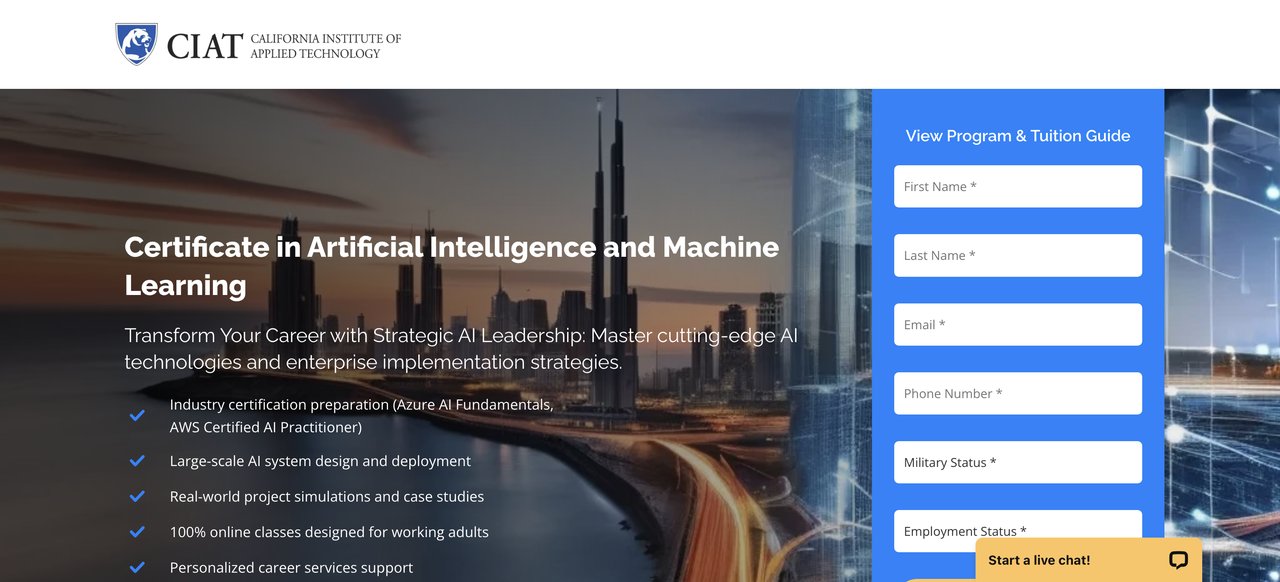
The Certificate Program by the California Institute of Applied Technology offers live, instructor-led training focusing on practical AI labs and industry frameworks. It is designed for professionals with IT experience and familiarity with cloud technologies.
Key Topics Covered: Practical AI labs, industry frameworks, enterprise applications
Target Audience and Skill Level: Advanced learners with 2+ years of IT experience
- Pros:
- Live, instructor-led training
- Focus on enterprise and practical AI applications
- Prepares for advanced AI career roles
- Cons:
- Requires significant prior IT experience
Who Would Benefit: IT professionals aiming to transition into AI-focused roles in enterprises.
Course 5: Big Data, Artificial Intelligence and Ethics by University of California, Davis

The Big Data, Artificial Intelligence and Ethics course on Coursera delves into AI fundamentals and ethical considerations. It is designed for beginners interested in the impact of AI on society.
Key Topics Covered: Big data opportunities, IBM Watson NLP, ethical considerations
Target Audience and Skill Level: Beginners interested in AI and ethics
- Pros:
- Beginner-friendly
- Focus on ethics and real-world applications
- Flexible self-paced learning
- Cons:
- Limited depth for advanced AI engineering
Who Would Benefit: Individuals new to AI looking to understand its ethical implications and real-world applications.
Course 6: AI for Business Specialization by University of Pennsylvania (Wharton)
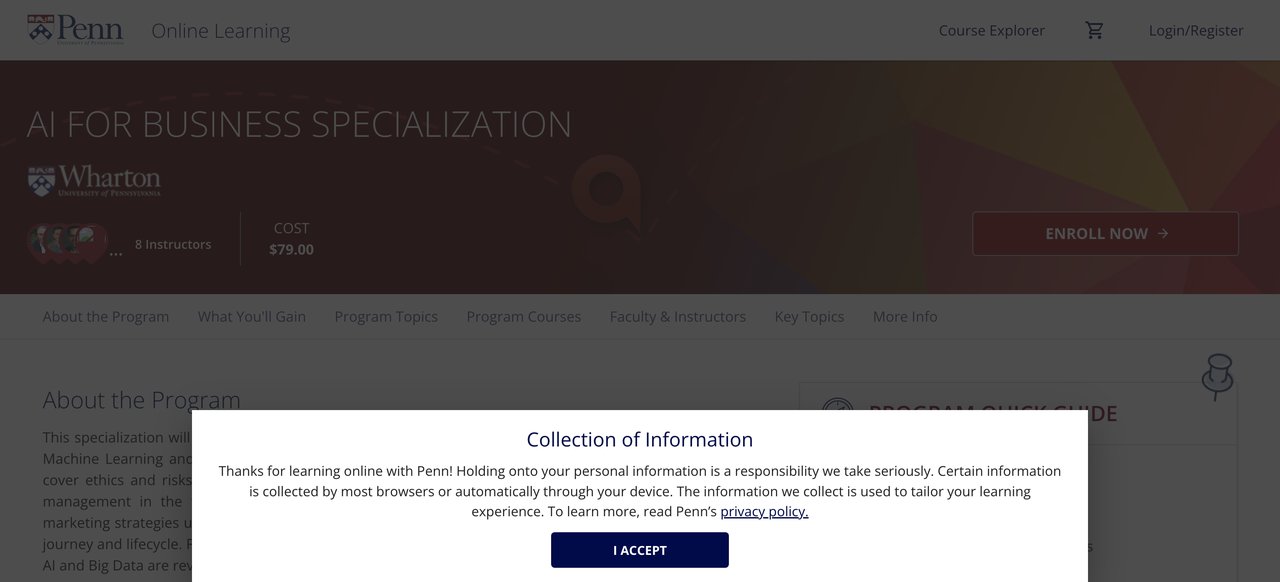
The AI for Business Specialization offers insights into AI applications in business contexts such as marketing, finance, and HR. It also covers ethical AI, bias mitigation, and governance.
Key Topics Covered: AI in marketing, finance, HR, ethical AI, TensorFlow
Target Audience and Skill Level: Business professionals interested in AI applications
- Pros:
- Business-focused AI applications
- Hands-on projects with practical experience
- Affordable pricing
- Cons:
- Less technical depth for AI developers
Who Would Benefit: Business professionals looking to leverage AI technologies in their fields.
Course 7: CS50’s Introduction to Artificial Intelligence with Python by Harvard University
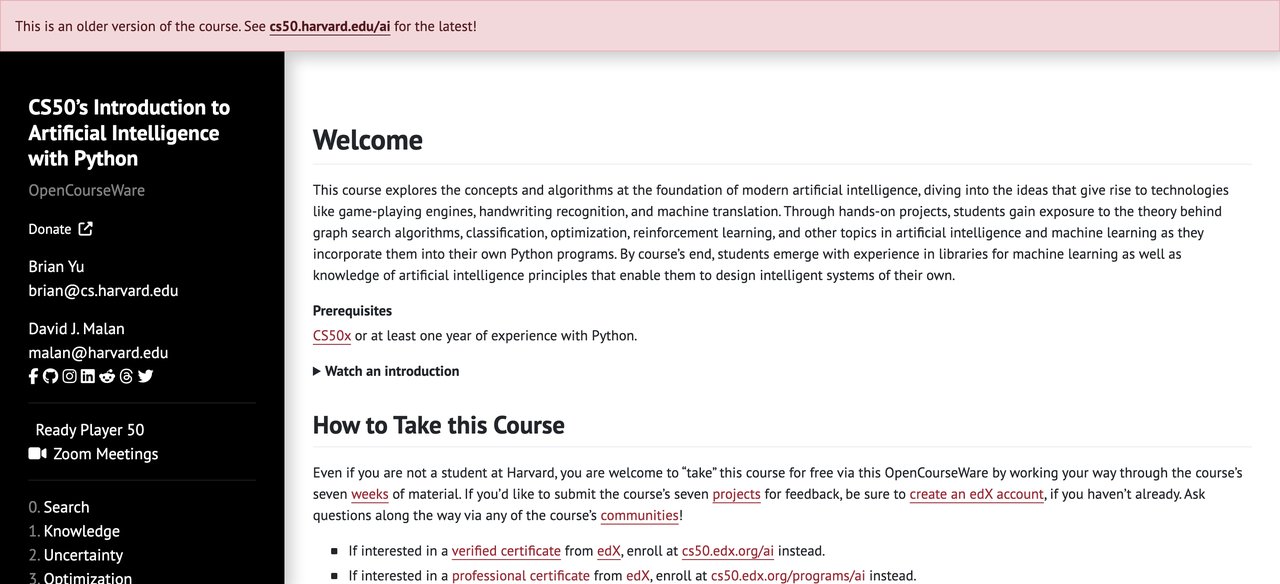
The CS50's Introduction to AI course provides a strong coding focus, teaching AI fundamentals and machine learning with Python. It includes practical projects like game-playing engines and handwriting recognition.
Key Topics Covered: Graph search, reinforcement learning, AI projects
Target Audience and Skill Level: Intermediate learners with Python knowledge
- Pros:
- Strong coding focus with Python
- Harvard professors as instructors
- Free audit option
- Cons:
- Requires 10-30 hours/week commitment
Who Would Benefit: Coders interested in applying AI techniques to software development and machine learning projects.
Course 8: Certificate Program in AI Business Strategy by Johns Hopkins University
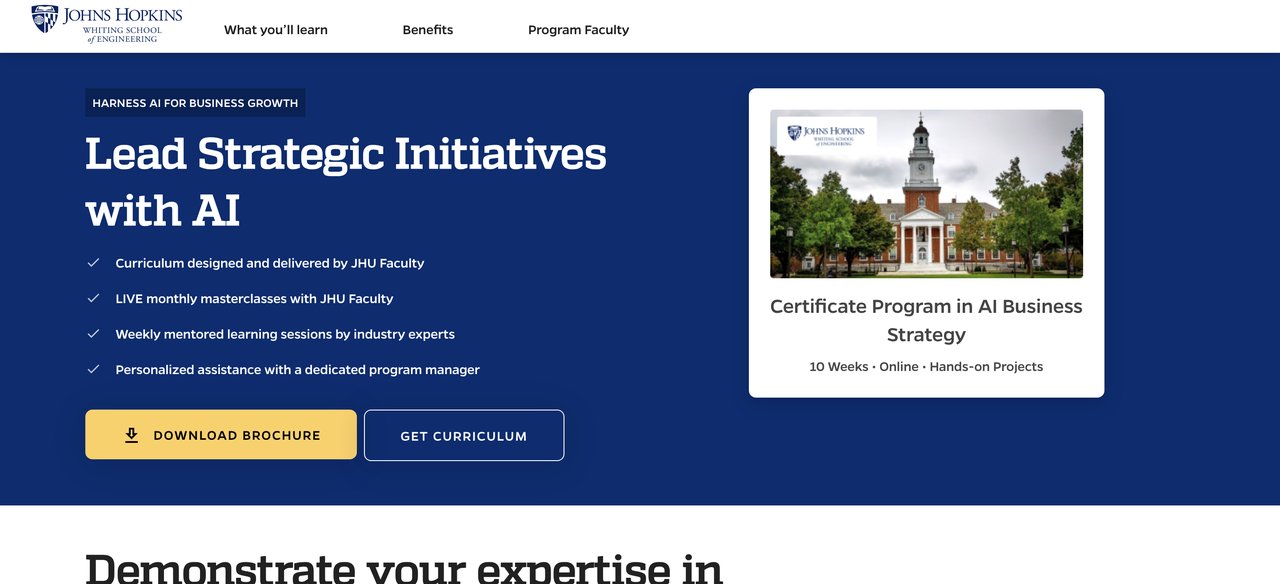
The AI Business Strategy program focuses on AI business strategy, ethical AI, risk management, and includes live masterclasses and mentoring.
Key Topics Covered: AI strategy, ethical AI, risk management
Target Audience and Skill Level: Executives and project managers in AI innovation
- Pros:
- Focus on AI strategy and leadership
- Industry mentors from leading companies
- Hands-on projects and live sessions
- Cons:
- Higher cost
Who Would Benefit: Executives and project managers seeking to drive AI innovation within their organizations.
Course 9: Develop LLM Powered Applications with LangChain by Udemy
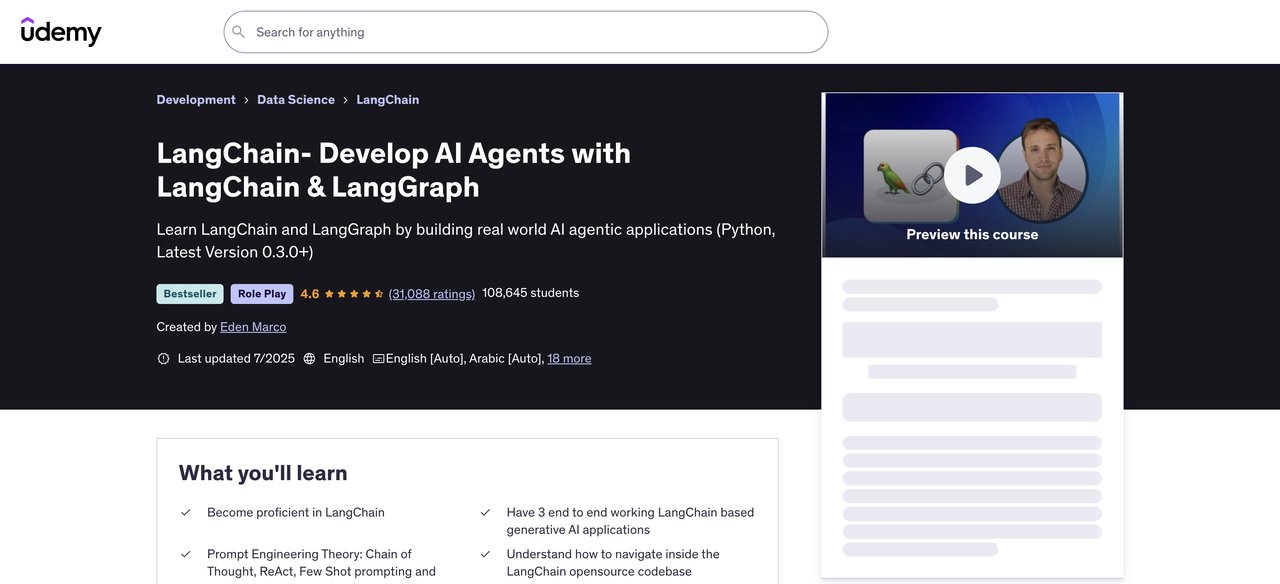
The LangChain course teaches how to build large language model applications using LangChain, ideal for Python developers.
Key Topics Covered: LLM applications, prompt engineering, vector databases
Target Audience and Skill Level: Python developers interested in LLM applications
- Pros:
- Affordable and practical
- Focus on cutting-edge LLM applications
- Regularly updated content
- Cons:
- Requires Python programming skills
Who Would Benefit: Python developers keen on developing advanced language model applications.
Course 10: Introduction to Artificial Intelligence (AI) by IBM via Coursera
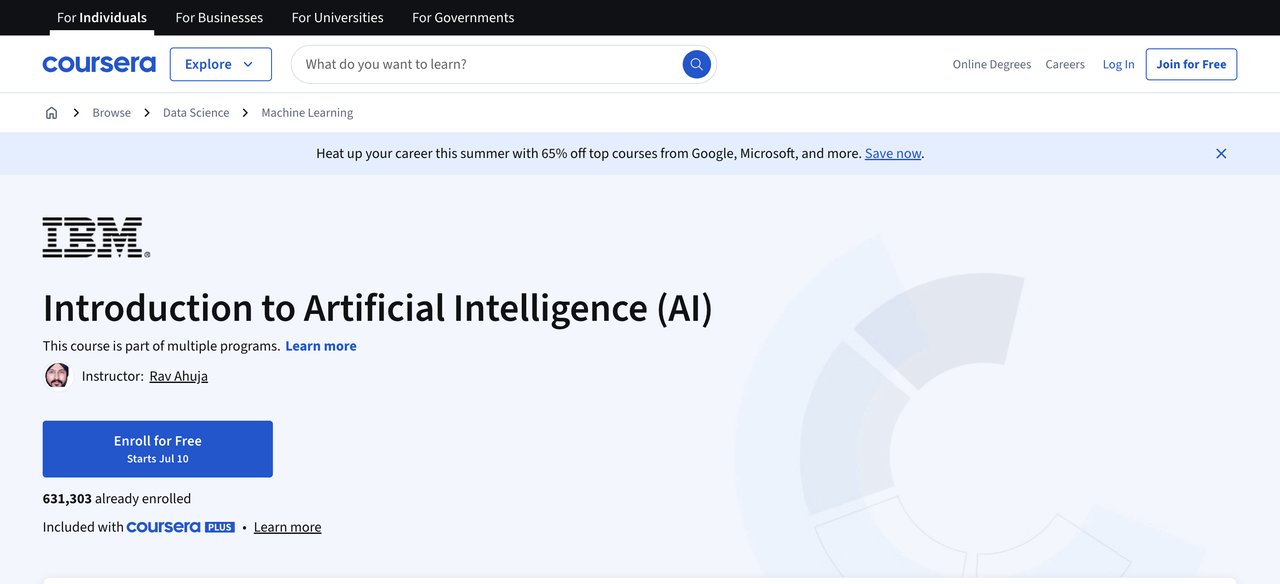
The Introduction to AI course covers core AI concepts and market opportunities, providing a foundation for those new to AI.
Key Topics Covered: Generative AI, NLP, market opportunities
Target Audience and Skill Level: Beginners new to AI
- Pros:
- High rating (4.7/5)
- Beginner-friendly
- Short duration
- Cons:
- May require further specialization for advanced AI engineering
Who Would Benefit: Beginners looking to understand how AI systems solve problems and recognize patterns.
Course 11: IBM AI Developer Professional Certificate by IBM via Coursera
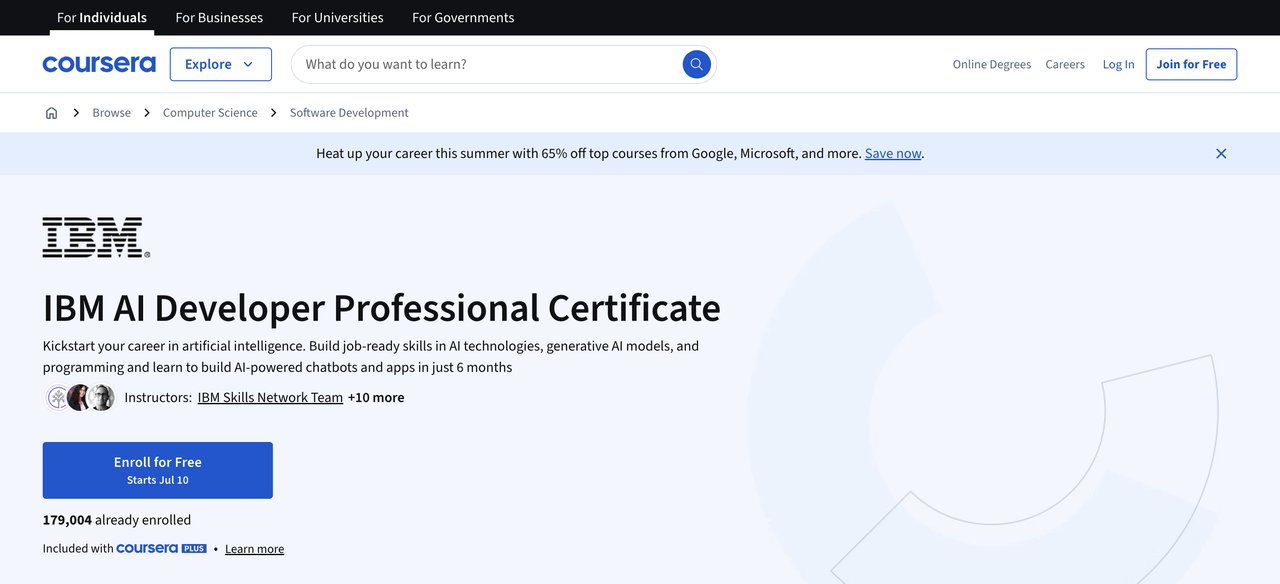
The IBM AI Developer Certificate program teaches prompt engineering, machine learning, and AI model deployment, suitable for process engineers developing AI applications.
Key Topics Covered: Prompt engineering, AI model deployment, software development lifecycle
Target Audience and Skill Level: Intermediate learners with some AI or programming knowledge
- Pros:
- Comprehensive curriculum
- Practical skills including software architecture
- Highly rated (4.6/5)
- Cons:
- Requires commitment over several months
Who Would Benefit: Process engineers interested in AI-powered applications and automation tools.
Course 12: Fundamentals of Machine Learning and Artificial Intelligence by AWS via Coursera
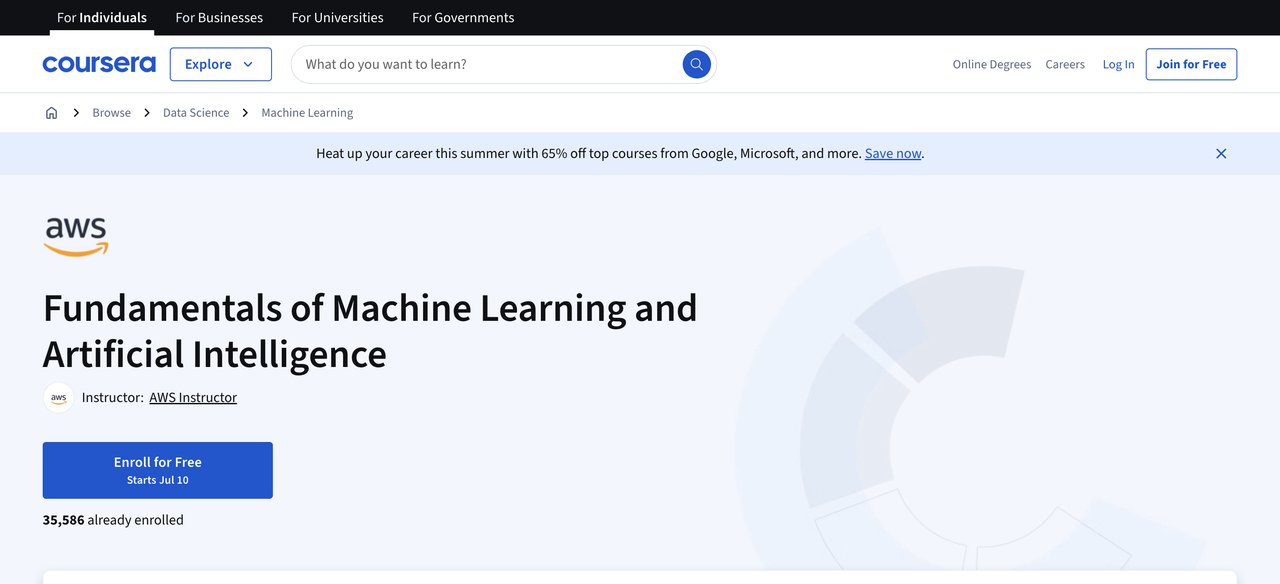
The Fundamentals of Machine Learning and AI course focuses on AWS tools like SageMaker, teaching process engineers to apply AI to optimize processes.
Key Topics Covered: AWS tools, AI and ML fundamentals, process optimization
Target Audience and Skill Level: Mixed skill levels, some cloud knowledge beneficial
- Pros:
- Practical AWS integration
- Free audit option
- Good for mixed skill levels
- Cons:
- Some AWS-specific content may require prior cloud knowledge
Who Would Benefit: Process engineers aiming to leverage cloud-based AI services for process optimization.
Course 13: Machine Learning Specialization by DeepLearning.AI via Coursera
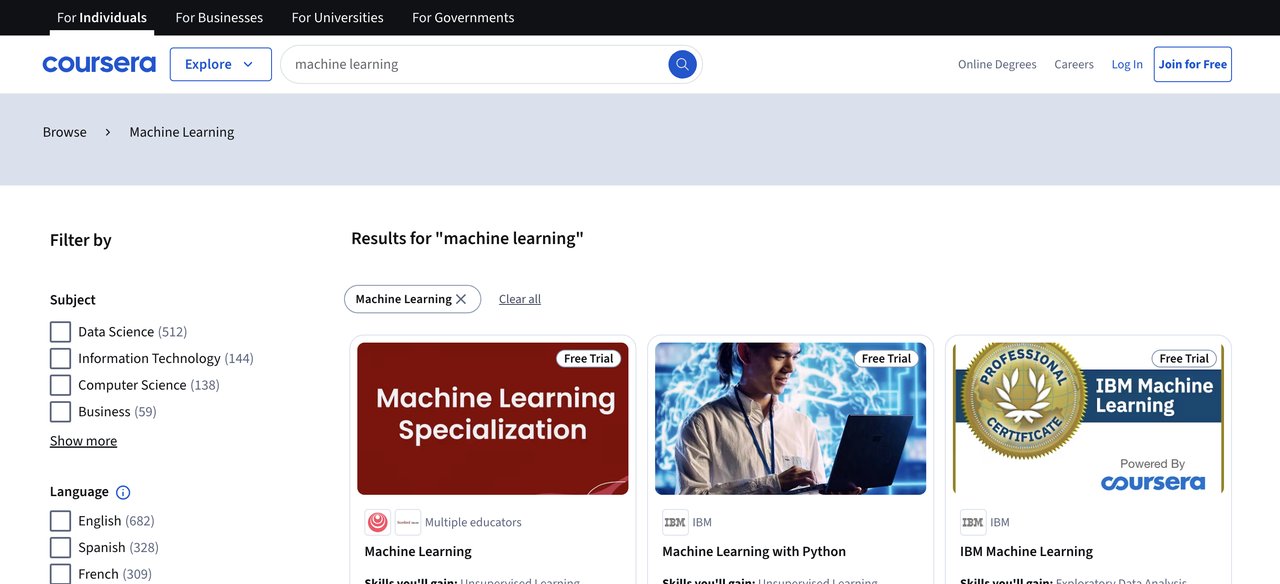
The Machine Learning Specialization covers supervised and unsupervised learning, decision trees, and neural networks, ideal for building predictive models.
Key Topics Covered: Supervised learning, decision trees, neural networks
Target Audience and Skill Level: Learners with programming and math background
- Pros:
- High learner rating (4.9/5)
- Comprehensive with hands-on projects
- Cons:
- Requires some programming and math background
Who Would Benefit: Engineers seeking to apply machine learning for predictive modeling and process optimization.
Course 14: IBM AI Engineering Professional Certificate by IBM via Coursera
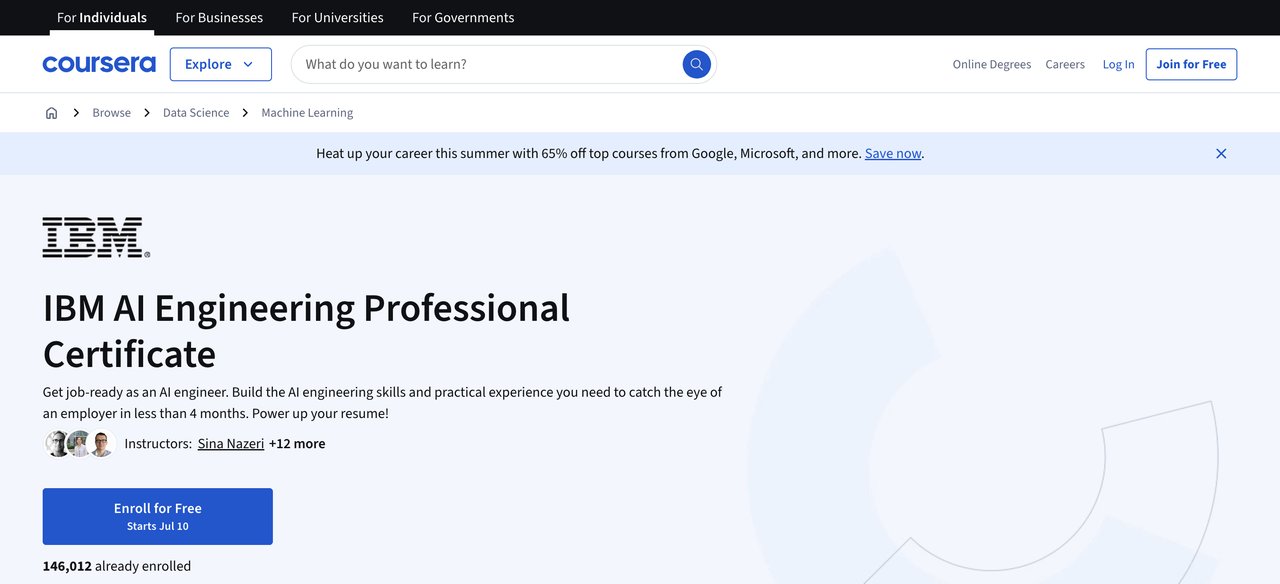
The IBM AI Engineering Certificate focuses on advanced AI skills such as deep learning and reinforcement learning, suitable for integrating AI into engineering workflows.
Key Topics Covered: Deep learning, reinforcement learning, NLP
Target Audience and Skill Level: Intermediate learners with AI or programming knowledge
- Pros:
- Practical AI engineering skills
- Highly rated (4.6/5)
- Cons:
- Requires prior AI or programming knowledge
Who Would Benefit: Process engineers looking to integrate AI into complex engineering systems.
Course 15: AI Foundations for Everyone by IBM via Coursera
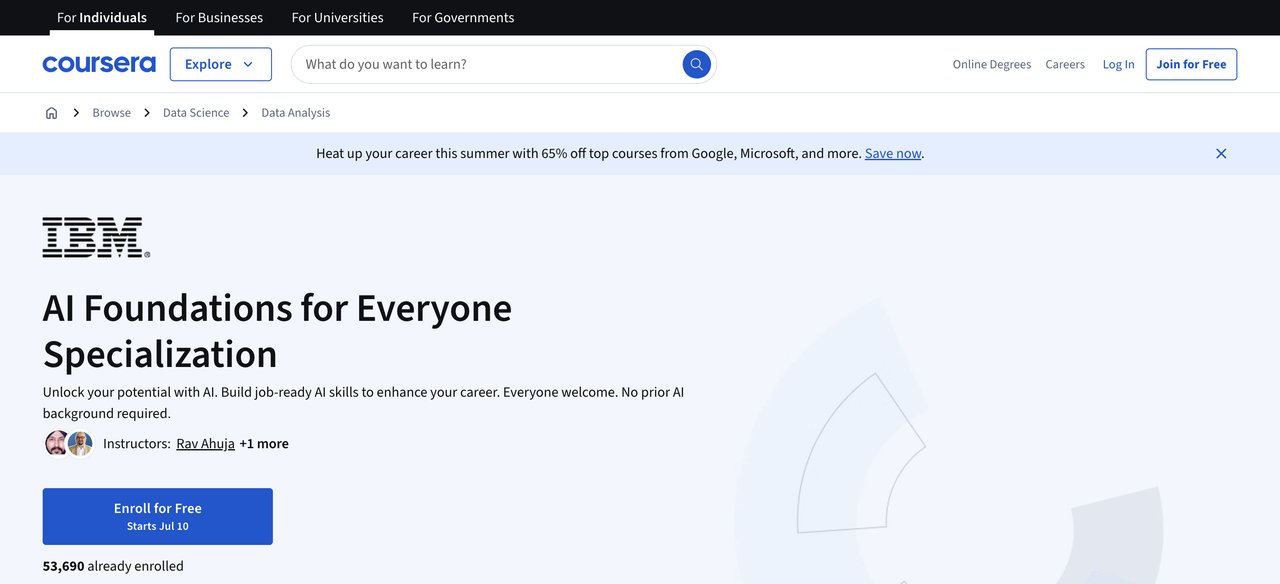
The AI Foundations for Everyone specialization is beginner-friendly, covering automation and AI tools for process engineers new to AI.
Key Topics Covered: Prompt engineering, generative AI, business process automation
Target Audience and Skill Level: Beginners new to AI concepts
- Pros:
- Accessible for beginners
- Covers automation and AI tools
- Highly rated (4.7/5)
- Cons:
- May need follow-up with technical courses for implementation skills
Who Would Benefit: Process engineers starting their journey into AI, seeking foundational knowledge and practical applications.
Overall Recommendations
Choosing the right AI course depends on your current skill level, career goals, and specific interests. For process engineers seeking a comprehensive and continuously updated curriculum, CompleteAI Training is an excellent and affordable option. For those with a coding background, courses like Udacity's Artificial Intelligence Nanodegree or Harvard's CS50 AI course offer deeper technical insights. Business professionals might find value in Wharton's AI for Business Specialization. Finally, for beginners or those interested in ethical aspects of AI, courses from IBM or UC Davis provide a solid introduction. Each course offers unique benefits, catering to different learning needs and career paths in the field of AI for process engineers.




